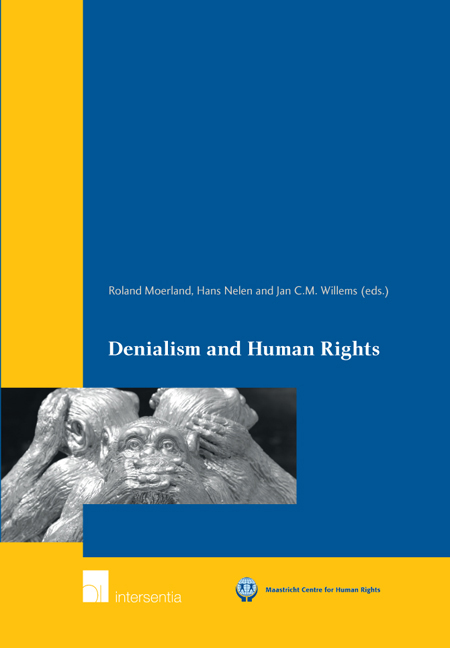Book contents
- Frontmatter
- Contents
- Acknowledgements
- Chapter I Introduction
- Chapter II Denialism and the Problem of Indifference
- Chapter III Denial and Acknowledgment in Public Responses to Information about Human Rights Violations
- PART I CHILDREN'S RIGHTS
- PART II GENOCIDE
- PART III (INTER)NATIONAL ORGANISATIONS
- PART IV NEW PENOLOGY
- PART V SOCIAL, ECONOMIC AND CULTURAL RIGHTS
- Chapter XVIII Poverty, Just World Thinking and Human Rights Law: A Study of the Relevance of Denial for Normative Legal Research
- Chapter XIX Genocide Denial and Refugees: A Lack of Protection in International Law?
- Chapter XX Climate Justice: Climate Change and Human Rights
- Chapter XXI A State in Denial: The ‘Intentional’ Sexual Transmission of HIV in South Africa
- Chapter XXII Olympic Idealism and Human Rights Infringements: How Athletes Cope with an Uncomfortable Reality
- Chapter XXIII Denialism and Human Rights: an Afterword
- About the Authors
- Maastricht Series in Human Rights
Chapter XVIII - Poverty, Just World Thinking and Human Rights Law: A Study of the Relevance of Denial for Normative Legal Research
from PART V - SOCIAL, ECONOMIC AND CULTURAL RIGHTS
Published online by Cambridge University Press: 19 September 2018
- Frontmatter
- Contents
- Acknowledgements
- Chapter I Introduction
- Chapter II Denialism and the Problem of Indifference
- Chapter III Denial and Acknowledgment in Public Responses to Information about Human Rights Violations
- PART I CHILDREN'S RIGHTS
- PART II GENOCIDE
- PART III (INTER)NATIONAL ORGANISATIONS
- PART IV NEW PENOLOGY
- PART V SOCIAL, ECONOMIC AND CULTURAL RIGHTS
- Chapter XVIII Poverty, Just World Thinking and Human Rights Law: A Study of the Relevance of Denial for Normative Legal Research
- Chapter XIX Genocide Denial and Refugees: A Lack of Protection in International Law?
- Chapter XX Climate Justice: Climate Change and Human Rights
- Chapter XXI A State in Denial: The ‘Intentional’ Sexual Transmission of HIV in South Africa
- Chapter XXII Olympic Idealism and Human Rights Infringements: How Athletes Cope with an Uncomfortable Reality
- Chapter XXIII Denialism and Human Rights: an Afterword
- About the Authors
- Maastricht Series in Human Rights
Summary
INTRODUCTION
Why is poverty continuously sidelined as a human rights concern? Can it be the case that we are collectively in denial about the true extent of this global social problem? And if denial is taking place, what should the law do about it? If we identify a form of self-deception as the ‘root cause’ of the sidelining of poverty as a human rights concern, what follows from a legal perspective? In addressing these questions, this contribution defends two theses:
It is prima facie plausible that a systematic and pervasive form of denial known as just world thinking or belief in a just world (BJW) lies behind the constant sidelining of poverty as a human rights concern.
The identification of denial is necessary, but not sufficient to derive normative conclusions in the field of law. The finding of BJW in operation in the sidelining of poverty as a human rights concern does not, by itself, provide guidance as to what changes (if any) need to be made to the law.
The goals of this contribution are methodological. It aims to show both the importance and the limits of certain ‘unmasking’ research programmes that claim to reveal hidden biases and motivations in human action (of which theories of denial and BJW form part) for normative legal research. Poverty and BJW are used as a springboard to derive more general conclusions about the relevance of this sort of social-scientific research for law.
The paper is organised as follows. Section 2 introduces the concept of denial. Then sections 3, 4 and 5 argue for thesis (1). Section 3 describes the problem of global poverty and the deficient response it has received from human rights law. Section 4 lists various forms of bad arguments that have been used to justify the relative exclusion of poverty as a human rights concern. Section 5 shows how these bad arguments can be explained as arising out of a form of denial. BJW is introduced as an overarching explanation of the pervasiveness and influence of bad arguments for the exclusion and downgrading of poverty as a human rights concern.
- Type
- Chapter
- Information
- Denialism and Human Rights , pp. 367 - 386Publisher: IntersentiaPrint publication year: 2016

